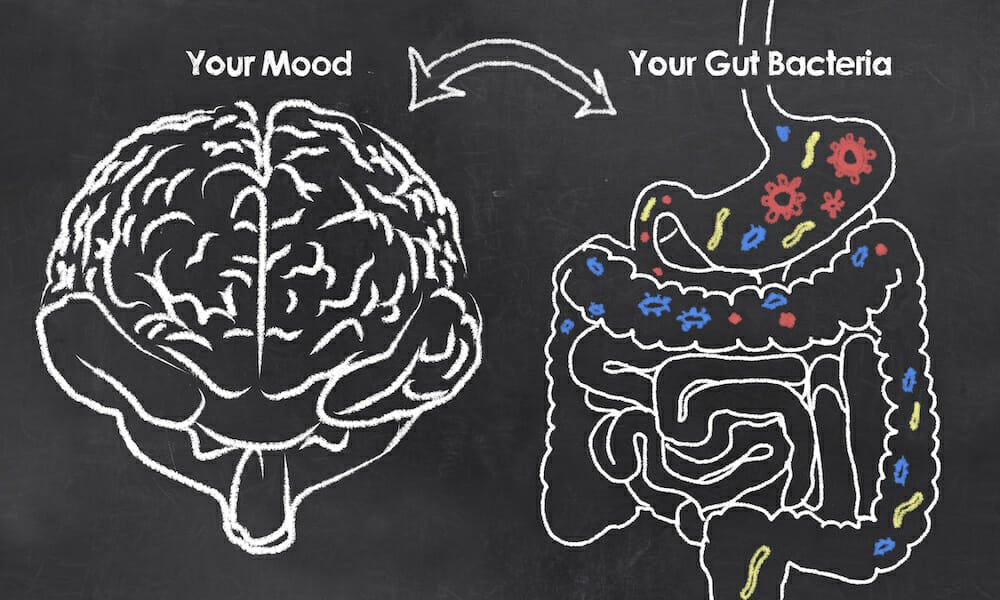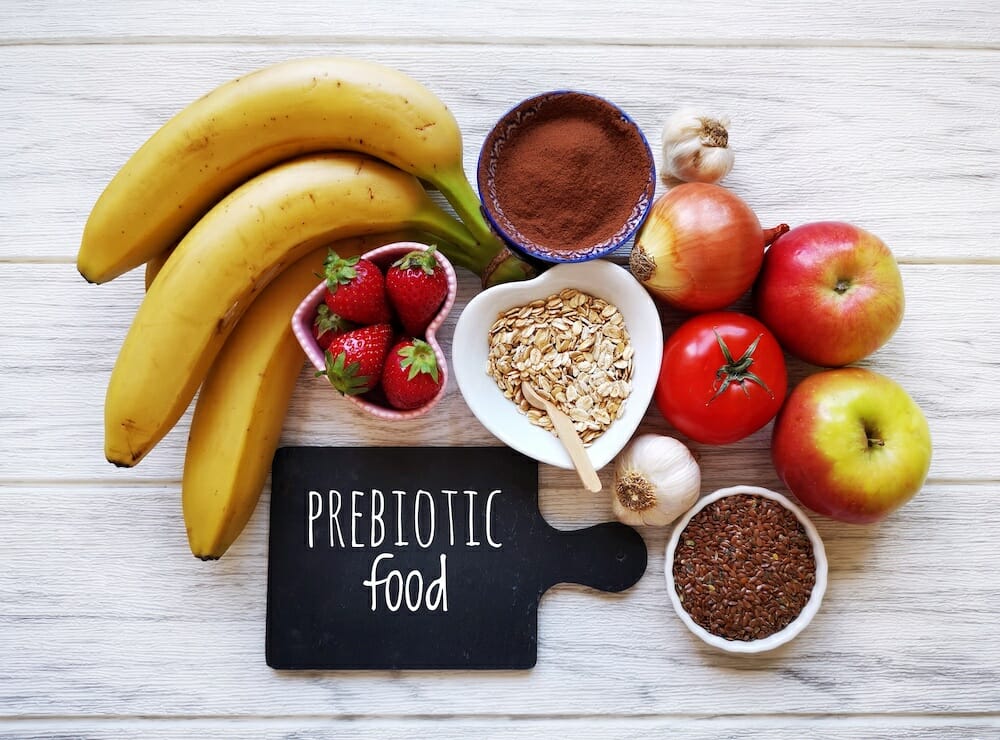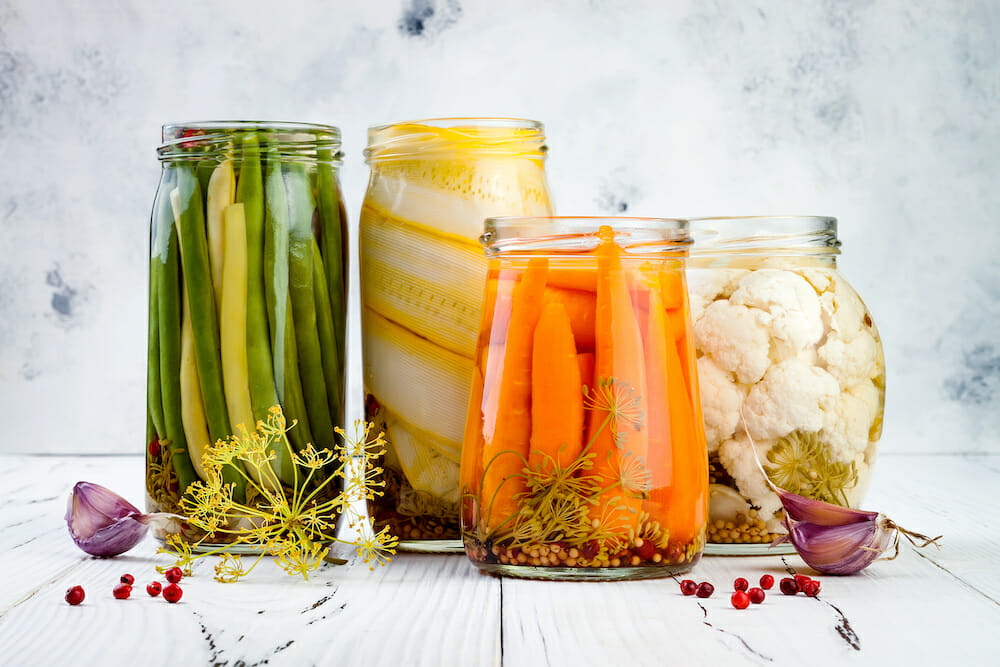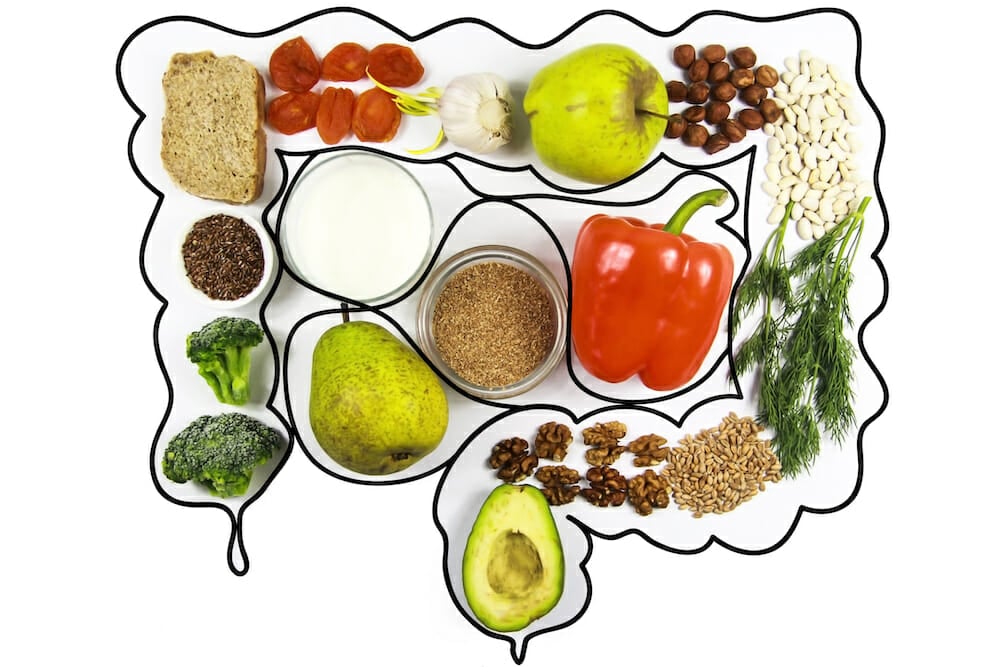We’ve known for decades that what you eat can impact how you feel. But few of us actually eat the best vegan foods for gut health or understand the importance of prebiotics and probiotics.
Even if you’ve already transitioned to a plant-based diet — to help end animals from suffering in factory farms, to improve your own health, or to decrease negative impacts to the environment from massive animal agriculture — it’s still important to pay attention to the types of foods you’re putting in your body in order to keep your gut healthy.
If the mitochondria is the powerhouse of the cell, the gut is the powerhouse of the body. The gut, or gastrointestinal tract, is made up of the mouth, esophagus, stomach, pancreas, liver, gallbladder, small intestine, colon, and rectum — and it’s one of the most important collections of body parts we have.
Anyone who has experienced an upset stomach (probably all of us) is well aware of how important it is to keep the gut happy. But did you know our gut health can also impact our mood, our energy levels, our metabolism, and even our skin?
Finding the best vegan foods for gut health can seem like a daunting task, but using this information guide will help you keep your microbiome happy and healthy.
Poor Gut Health Impacts More Than Just Our Stomachs
The gut protects our body. But we only get out of it what we put into it. Unfortunately, most people neglect the health of their gastrointestinal tracts and digestive systems, which can throw off an important balance in our microbiomes — a collection of trillions of bacteria, microscopic viruses, and even fungi.
Our microbiome is responsible for keeping our physical and mental health in check. An unbalanced gut can lead to all sorts of problems, not just an upset stomach. The microbiome helps people digest food, regulate their immune systems, and protect against disease. The gut also produces important vitamins that people need, including B12, thiamine, riboflavin, and Vitamin K.
“Our gut plays a major role, not only in our gastrointestinal health but in the health and wellbeing of the entire body,” said Dr. Lisa Ganjhu, a clinical assistant professor of medicine at NYU Langone Medical Center. “All foods we eat are in communication with immune receptors in the digestive tract, triggering hormones and various cell types that help the body with its immune function.”
The gut’s impact doesn’t stop at physical health, either. Our microbiomes impact our brains, too.

“Studies have shown how gut bacteria in the microbiome impacts mental function,” Dr. Uma Naidoo, a nutritional psychiatrist, told LIVEKINDLY. “An unhealthy gut microbiome leads to an unhealthy brain and vice versa. The power of brain food can reset your microbiome and steer you back to a healthy mental state.”
Common Problems Associated With Poor Gut Health
If your microbiome is unbalanced and your gut health is poor, you might experience a number of unwanted symptoms.
Most obviously, poor gut health can lead to indigestion, upset stomach, constipation, diarrhea, stomach cramping, bloating, gas, and even bad breath. That might sound like a Pepto Bismol commercial, but not having a happy microbiome is serious and can have lasting impacts on our overall health.
An unbalanced microbiome also can lead to:
- Decreased energy levels and sluggishness because of inefficient nutrient absorption
- Increased risks of cancer because of a lack of short-chain fatty acids
- Increased risks of arthritis because of increased levels of Prevotella copri (a bad bacteria found in the gut)
- Worsening moods
- Increased risks of Type 2 Diabetes
- Increased risks of skin conditions like eczema, acne, and psoriasis because of a lack of dietary fiber and increased consumption of dietary allergens
Wow, that’s scary! Luckily, it isn’t difficult to keep the gut happy.
How to Keep Your Microbiome Balanced and Healthy
The microbiome is a collection of trillions of microbes — bacteria, fungi, protozoa, and viruses — delicately balanced to maintain a symbiotic relationship between all organisms, both good and bad.
When the bad microbes start to take over the microbiome, disease and other health problems can occur. That’s why it’s important to keep the microbiome balanced and healthy.
The easiest way to keep a healthy balance of microbes and heal your gut in a plant-based diet is to eat gut healthy foods with a wide range of prebiotics and probiotics.
Gut-Healthy Foods
The gut needs a good combination of prebiotics and probiotics. The prebiotics — or compounds in food that create growth or activity of beneficial microorganisms, such as bacteria and fungi — feed the probiotics, or live organisms. The probiotics help move foods through your digestive tract. Without a healthy microbiome, the gut gets overrun by bad bacteria.
But which foods are the best for gut health?
Prebiotic Foods

Garlic, Onions, and Leeks
Garlic, onions, and leeks are all part of the Allium food genus, and Allium vegetables are rich in prebiotics. More specifically, garlic, onions, and leeks have an abundant amount of inulin and fructooligosaccharides, which are non-digestible fibers that travel through the intestine and eventually become food for probiotics.
Asparagus and Artichokes
Asparagus and artichokes are both rich in soluble fibers, which coat the digestive tract and serve as food for probiotics, such as Lactobacillus and Bifidobacteria. They’re also rich in insoluble fibers, which do not feed probiotics, but do add bulk to stools and promote healthy bowel movements — another important aspect of a healthy gut and digestive system.
Bananas and Apples
Bananas and apples are both fiber heavy fruits. The resistant starches in bananas and the soluble fibers in apples both feed probiotics and help to form beneficial compounds called short chain fatty acids. The insoluble fiber in both fruits also help to reduce bloating and promote feelings of fullness, which helps to prevent harmful overeating.
Oats and Barley
Both oats and barley are complex carbohydrates, which slow down digestion and help to control appetites. But they also contain plenty of prebiotics. Beta-glucan fibers, which are prevalent in oats and barley, help boost probiotic production. They’re also both rich in nutrients and vitamins.
Seaweed
Seaweed is actually a superfood. It contains more fiber than most fruits and vegetables, including agars, carrageenans, and fucoidans, which are thought to act as prebiotics. If that wasn’t enough, seaweed is also rich in sugars called sulfated polysaccharides, which promote the growth of good bacteria for a better vegan gut health.
Honorable Mentions
Chicory Root, Dandelion Greens, Whole Wheat Grains, Jicama Root, Yacon Root, Konjac Root, Cocoa, Burdock Root, Flaxseeds, Mushrooms, Cabbage, Red Kidney Beans, Chickpeas, Watermelon, Grapefruit, and Peaches.
Probiotic Foods

Tempeh and Natto
As fermented soybean products, both tempeh and natto are unique foods to boost the microbiome. Phytic acid is broken down in soybean products, which boosts both digestion and the absorption of vitamins and other nutrients. Tempeh and natto are two of the best fermented foods for gut health, especially considering they contain prebiotics, too.
Pickled Vegetables
An easy way to boost probiotic and prebiotic microbiome levels is pickled vegetables. Vegetables are already a great source of soluble fiber and prebiotics, and the pickling process helps to develop healthy levels of probiotics, too. And it doesn’t only have to be pickled cucumbers. Onions, garlic, carrots, or any other delicious vegetable can be pickled.
Sourdough Bread
Who said white bread can’t be healthy? Sourdough promotes a healthy gut through its fermentation process, which reduces the amount of gluten in the bread, enhances the bioavailability of its nutrients, and releases more fiber. The more fiber, the higher the chance of adding helpful bacteria to the microbiome.
Sauerkraut
Sauerkraut is more than just good luck each New Year’s Day. It also adds up to 28 distinct bacterial strains to your microbiome. Eat ‘kraut and say goodbye to gas, bloating, constipation, diarrhea, and other symptoms associated with an unbalanced microbiome.
Kimchi
Put down the yogurt and pick up the kimchi. Kimchi has the same healthy lactobacilli bacteria found in yogurt and other fermented dairy products but with none of the cruelty involved. These good bacteria will aid in digestion and overall gut health.
Miso
Miso is an easy way to add probiotics to your healthy gut diet plan. It is full of probiotics, including A. oryzae, which helps decrease the risk of certain digestive problems. Drink miso broth by itself, or add miso paste to sauces and soups.
Kombucha
Kombucha is one of the most gut friendly foods available. Bacteria is added to green or black tea with yeast and sugar. The bacteria feeds on the yeast and sugar and creates a symbiotic colony of living bacteria. When you drink Kombucha, this is added to your microbiome.
Vinegars
Like kombucha, vinegars produce acetic acid through their fermentation processes, which promote the growth of healthy gut bacteria. Both kombucha and vinegar are one of the best foods that heal the gut.
Supplements
There are plenty of vegan probiotic supplements, if you don’t want to eat any of the delicious gut healthy foods mentioned above. Just be sure to double check that the capsule the prebiotics and probiotics are delivered in does not contain gelatin, which is made of animal bones.








